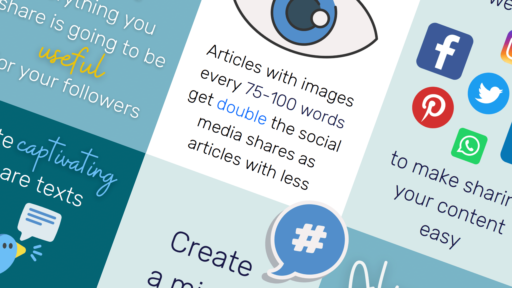The impact of social signals is one of the most widely debated topics in SEO. Everyone wants to be on the first search engine ranking page (SERP), but most aren’t sure how.
Google keeps their PageRank ranking algorithm top secret, so a lot of it is a guessing game. Especially as they’re always changing it.

Source: GIPHY
So, what are the ranking factors that Google has confirmed? What are social signals? And what part do they play?
Let’s check out the most up-to-date information for the most popular search engine (sorry, Bing!)
What are the known search engine ranking factors?
Google’s main goal is to help searchers find what they’re looking for. First time. That’s why the algorithm is always changing – to keep up with new trends and user metrics.
Search engines take hundreds of things into account when determining search rankings. We’d be here all day if we tried to list them all.

Source: First Page Sage
Search engine optimization (SEO) is the process of trying to make your content as rankable as possible.
According to Search Engine Journal, the top-ranking signals on Google are:
- High-quality content
- Mobile-first indexing
- Page Experience (making it user-friendly)
- Page speed
- On-page optimization (behind the scenes stuff like metadata)
- Internal links (between other posts on your site)
- External links (backlinks)
If that’s the case, why do people bother with social media marketing at all?
What are social signals?
Social media is a huge part of digital marketing these days. Over half the planet’s population is on some form of social media channel. So it’s not really a surprise.

Source: Hootsuite
Social signals are the collective likes, views, and shares of social media posts. This engagement signals to search engines that you’re producing valuable and relevant content. (And that’s what Google wants to show searchers.)
This includes social media platforms like Twitter, Facebook, LinkedIn, Pinterest, and Instagram – all widely used for online marketing. But it also applies to community sites like Quora and Reddit.
But this raises questions:
- Is it just vanity metrics such as likes and retweets that Google uses to measure value?
- Does follower count or social media presence make a difference?
- What about micro-influencers who have smaller followings but higher engagement?

Source: AppFollow
Well…it’s complicated.
Are social signals a ranking factor for SEO?
Content marketing is one of the main focuses for SEO strategists.
Up until 2016, Matt Cutts was the man in the know at Google. He was head of the webspam team and became kind of an unofficial spokesman for Google search.

Source: YouTube
If you were building an SEO strategy back then, you were watching Google’s Webmaster YouTube videos.
He and the company went back and forward over the years when asked about the relevance of social signals for SEO.
Here’s a brief (confusing) timeline:
- May 2010 – No, they’re not important.
- December 2010 – Okay, now they are. Also, the creator’s “authoritative status” is now being taken into account.
- January 2014 – Facebook and Twitter pages are being treated like any other web page. But follower counts don’t have any impact.
- 2014-2021 – …
- 2021 and beyond – Who the heck knows?!
The last bit of solid knowledge that Matt gave us was the warning not to confuse ‘correlation’ with ‘causation’ when it came to social engagements and SEO.
So, maybe they don’t directly impact search rankings on Google…yet. But Google definitely values them. Here’s why you shouldn’t give up on social signals.
The role of social media in SEO
In 2015, Google and Twitter started a new strategic partnership which meant Tweets appeared in organic search rankings.

Source: LinkedIn
For Google, it meant real-time content from social networks in their search results. For Twitter, it gave them access to new potential users from Google Search. It also dawned the age of social media impacting SEO.
Using focused keyword research and link building are known elements of SEO. But engaging your audience with social media content was thought to produce signals that could affect your Google rankings, too. They could even drive organic traffic.
This may still be the case. Social signals tell Google that your social media profiles and content are valuable. But increasing them is no easy feat.
In a nutshell, it’s all about visibility. Using social media to increase brand awareness makes other sites more likely to link to your content. And inbound links definitely are a ranking factor.

Source: Smart Insights
So, while they may not be a direct ranking factor, social signals can still help your SEO in an indirect way.
Here are a few other ways social media can affect SEO:
- Being active on multiple platforms builds trust with your target audience
- Social shares mean way more people see your content
- More visibility = backlinks to your content
- Your brand’s social platforms can also rank for relevant keywords
So, social signals can have an impact on your website’s rankings. Or, at the very least, by trying to increase them, you’ll be building brand awareness. Either way, it’s worth a try!
How to optimize your social media platforms for SEO
If you already have a social media strategy in place, you might be working on increasing your social signals already.
But whatever stage you’re at, you firstly need to make sure you have optimized your social channels for SEO.
Here are some dos and don’ts for doing so:
| Do | Don’t |
| Keep your bios consistent | Have different profile pictures |
| Optimize images for each specific channel | Upload low-quality media |
| Be discoverable in search (keyword research) | Stick to the same boring copywriting |
| Test all links before and after you post | Have an incomplete profile |
| Cross-promote your website & social profiles | Allow any inappropriate photos or tags |
Remember, we’re focusing on visibility and brand awareness here.
Whenever your audience sees your brand on their favorite platform, they should see quality content and consistency. As humans, we trust things that we can rely on. You need to be one of those things.

Source: Sprout Social
Once you’ve got your profiles nailed, you want to give your content the best chance of being shared. Social shares are one of the most important social signals, but they can be tough to acquire.
The link between social signals and engagement
So, how can we get more of these pesky social signals in general?
As you probably know, increasing social media engagement is no walk in the park. It takes time and effort. You can’t just “set and forget”.
Genuinely engaging with other users yourself is one of the best ways of accumulating engagement on your own content. It’s a simple concept, but you need to be committed.

We wouldn’t do it justice in a single paragraph, so we’ve written a whole blog post on that topic if you want to know more: “Successful Social Media Engagement Is a Two-Way Street”.
How to increase your social signals
Aside from genuinely engaging on social media, there are things you can be doing every time you post.
Here are some more actionable tips:
- Post regularly – Visibility, visibility, visibility.
- Keep it visual – Images and videos still rule the content marketing world.
- Link to your site – In your bios, profiles, or with social sharing buttons on your site.
- Competitions and giveaways – Nothing sparks engagement like a contest.
- Partner with other brands – Create content together and double the promotion!
Obviously, you can’t guarantee that people will follow you or like your posts. But back to those social shares. What if there was a way you could guarantee those?
An automated tool for guaranteed social media shares
There’s no point creating content if nobody sees it. So, how can we make sure our piece of content is shared on social media sites?
Introducing Quuu Promote. It’ll make sure you get social media shares from real humans.
But how does it work?
Simply pick your plan, add your site’s RSS feed, and content will be reviewed by our AI specialist. Once it’s approved, watch the shares roll in on Facebook, LinkedIn, and Twitter.

Everyone sharing your content has manually signed up on the Quuu (content curation) side of the business. They’re all real people who sign up for content from interest categories in your niche.
All that’s left to do then is track your shares. The best platform for this is Twitter, as you can see the mentions as they roll in. Then you can start engaging with those who have shared (remember the previous section!)
If there’s one form of social signal you can increase right here, right now – it’s shares.
Conclusion
In a 2012 Moz report, they stated the impact of social signals would “eventually surpass links as the most valuable ranking factor”. Whether that’s true or not remains to be seen.
What we do know for sure is that the world is becoming more and more social.
People tend to rely on reviews from their friends instead of search engine suggestions. Brands that have a strong social presence also usually have a more loyal user base. More loyal users mean more conversions for your service or product.

Source: GIPHY
Social signals could well be a direct ranking factor one day. Until then, you’re doing all you can to increase your brand visibility on different platforms. And that can’t hurt.
Do you think social signals will ever be a ranking factor? Are there any tactics for increasing them that you think we missed? Let us know in the comment section!





